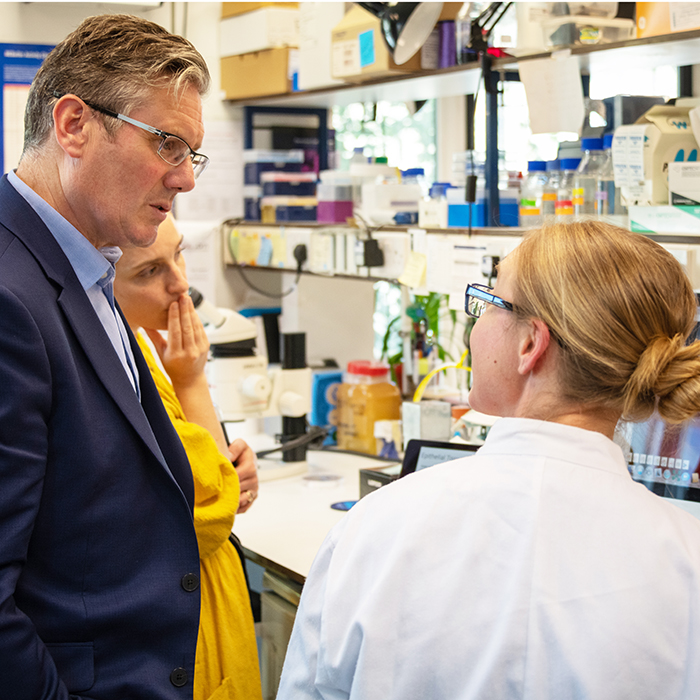Sir Keir Starmer visits MRC units at UCL
Sir Keir Starmer, Shadow Secretary of State for Exiting the EU and MP for Holborn and St Pancras, visited University College London on June 28th to learn about research taking place in two departments funded by the Medical Research Council (MRC) – the MRC Unit for Lifelong Health and Ageing at UCL (MRC LHA at UCL) and the MRC Laboratory for Molecular Cell Biology at UCL (MRC LMCB at UCL).
The visit opened with interactive presentations by the MRC LHA at UCL, followed by a tour of the MRC LMCB at UCL. Sir Keir was met by Prof Nish Chaturvedi, director of the MRC LHA at UCL and Prof Mark Marsh, director of the MRC LMCB at UCL, with whom he had the opportunity to discuss the prospects and challenges facing the UK and global research communities.
Prof Nish Chaturvedi presented an overview of her Unit and its mission to better understand the determinants of healthy ageing. Dr Wong from the MRC National Survey of Health and Development (NSHD) highlighted the life-long effects of early life air pollution on adult height and lung function, Sir Keir was startled to learn that one in two adults of South Asian and of African Caribbean origin in the UK would have diabetes by the age of 80; discovered in the Southall And Brent Revisited (SABRE) cohort. Professor Richards emphasised the importance of identifying an early marker of dementia, amyloid β in the brain, as a way of discovering new ways of slowing or even preventing the onset of dementia. Dr Davis of the Camden based Long-term Information Knowledge for Ageing study (LINKAGE) older age cohort said “Sir Keir understood our graphic illustration of social inequalities in disease and longevity, chiming with experience of his own constituency. I was delighted that he wanted to know more about our research, and its potential for impact on health care and policy”
The mission of the MRC LMCB at UCL is to use multidisciplinary approaches and cutting-edge technology to understand the behaviour of cells and their connection to disease. Sir Keir met researchers who use model organisms to address key questions in the biomedical field, including the mechanisms for wound healing and nerve regeneration. Prof Marsh said, “Sir Keir’s visit was a great opportunity for us to tell our local MP about some of the exciting research conducted at UCL and how important core-funded institutes, like the MRC LMCB at UCL, are for UK science”.
He visited the Experimental Optics Laboratory, run by Prof Ricardo Henriques, where cutting-edge concepts from optical physics and computational sciences are applied to microscopy, enabling innovative biological imaging. He was shown the first microscope in the world capable of imaging thermophilic archaea, microorganisms that grow in volcanic springs at 75°C. Dr Henriques said, “Meeting Sir Keir gave us the opportunity to showcase how the MRC LMCB is impacting innovation, discovery and education both locally and internationally. Sir Keir has a clear understanding of the key advantages gained by supporting a diverse research community”.
Finally, he visited the High Content Biology Laboratory, run by Prof Robin Ketteler, where he met researchers who use the facility to identify broad-spectrum anti-viral drugs and discover new characteristics of cancer cells that might be targeted by new therapeutics.
Sir Keir said, “It was fascinating to meet the MRC teams at UCL, and gain a first-hand understanding of the ambition of their work. It’s a privilege to have scientists from across the world choose to work in Holborn & St Pancras. Now is a challenging time for international research in the UK and this visit was a timely reminder of the importance of protecting these institutions.”
Image credit | Barbara Fasulo
 Close
Close


